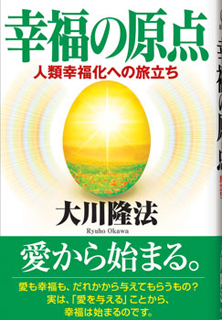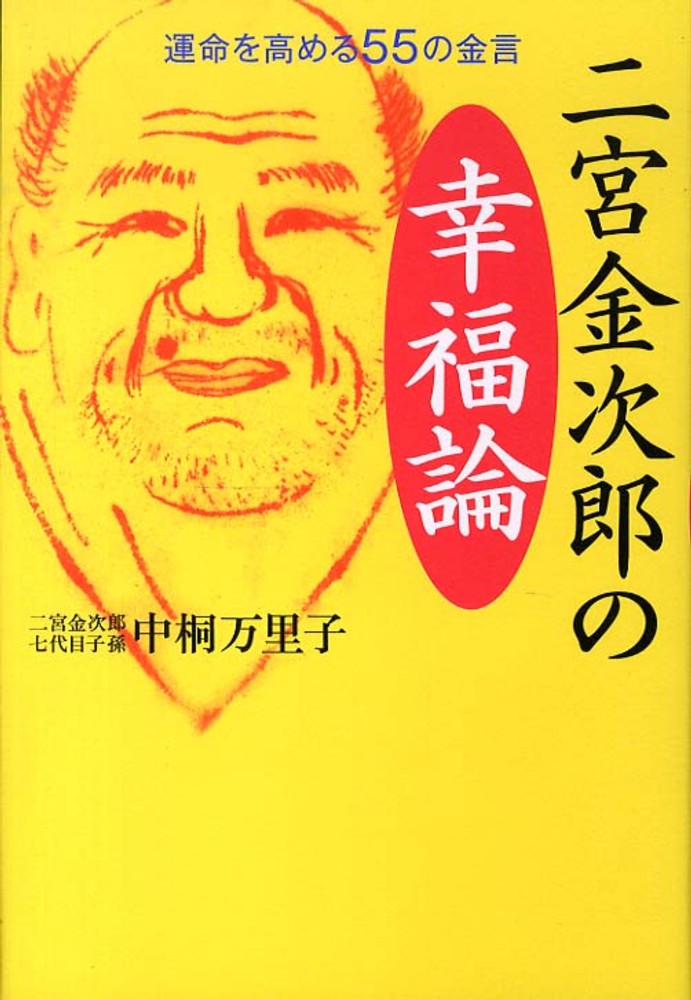'Competition with others' and 'Friendly competition to improve each other' - "Parable of the Water in the Tub" of Ninomiya Kinjiro
Sow and nurture seeds of of happiness
August 2023
Comparison with Others
The following is written in "T he Origin of Happiness" by Master Ryuho Okawa.
 ”Kofuku-no-genten(The Origin of Happiness)" by Ryuho Okawa
”Kofuku-no-genten(The Origin of Happiness)" by Ryuho OkawaSometimes a baby is smiling by itself. In such cases, they are often happy to see the smiling faces of the higher spirits in the heavenly realms. When a person has just been born, he or she often can see spirits because he or she has an honest heart. ..... However, as we gradually become more and more familiar with this world, we begin to lose sight of such a world. And we begin to live as if the earthly world is all there is.’ (The Origin of Happiness, chapter 2)
Since each of our souls comes from heaven and dwells in the baby in the mother's womb, we are all born with an honest and untainted soul.
‘And eventually the comparison with others comes to our minds. ..... Through this comparison with others, eventually, some people will become dissatisfied and grow troubled. They begin to forget that their life started from zero and begin to mistakenly believe that this world is their eternal home.’ (The Origin of Happiness, Chapter 2)
An elderly teacher at a junior high school once told me : The police called to report a shoplifting by a girl, so I went to pick her up and talked with her in the school. The girl said “All my friends have it, but my family is too poor to buy it. That's why I stole it. It is such a society that is bad.” In such a case, I was used to hear from her “I’m sorry. It won’t happen again” …..
Compared to others, she stole because of her own poor environment and justified it ..... Human logic has blinded us to the fact that “we should not steal what belongs to others." Children are not well taught right and wrong.
Each person chooses an environment that suits him or her and is born to challenge various issues within that environment to improve his or her soul. If you blame society or others, you will not be able to solve your own problems and improve your soul. To improve one's soul means to be able to feel and think closer to God (Buddha), and it is very important to consider right and wrong from God's viewpoint.
In the same book, Master Okawa writes: "In the end, I want you to know that 'suffering is born in the area of comparison with others’. As we grow older, this comparison has two meanings. One is the 'competition with others’. The other is ‘friendly competition to improve each other’. Depending on which of these two aspects one focuses on, one's life can change drastically. If you begin to think only in terms of sense of being above or below others, your life will be filled with suffering. But when you look strongly in the direction of friendly competition, a great gospel will emerge. (The Origin of Happiness, Chapter 2)
We are born into an environment that seems best for the betterment of our souls. We should accept our environment, engage in friendly competition with others who were raised in different environments, and strive to improve each other's souls.
Knowing that you have enough
"Knowing that 'my life is to start from zero, and that I am who I am today because of the guidance of many people over several decades,' ultimately leads to ‘knowing what is enough’. ‘Knowing what is enough’ never means `It is good as it is. It’s fine as it is, there’s no need for any development. You should be content with the way things are.” It is a heightened awareness or turn of view that allows a new world to emerge. ..... Without such a turn of view, you cannot truly discover the meaning of your life." (The Origin of Happiness, Chapter 2: On the Love of Giving)
 Kofuku-no-Genten by Ryuho Okawa
Kofuku-no-Genten by Ryuho OkawaWe were all born naked and we are who we are today thanks to various people. With gratitude to those who have supported us, we can make ourselves happy by living a life of happiness for others.
Ninomiya Sontoku (Kinjiro) (1787-1856) was a leader in rural reconstruction policies, aiming for a prosperous society. One of his teachings is the "Parable of the Water in the Tub: " "If you try to draw the water in the tub towards you, it will run away, but if you push it towards the other person, it will come back to you." This is a parable.
In “The Happiness Theory of Kinjiro Ninomiya”, Ms Mariko Nakagiri, a seventh-generation descendant, wrote: "All human beings are born in a state like an empty washbasin. In other words, they are born without property, ability or anything else at first. Then, nature and many people fill that tub with water. Only those who realise how grateful they are for that water want to give it to others and feel that they want someone else to be happy and try to push the water towards them. ..... If you give (happiness) to others, it will come back and never leave you, but if you think the water belongs to you, or if you take it for granted that you will be filled with water and try to scrape up more and more, not enough, not enough, more, more, happiness will run away." She explains the parable as such.

“The Happiness Theory of Kinjiro Ninomiya” by Mariko Nakagiri
It is important to appreciate what others have given us and striving to know that by striving to make others happy, we ourselves can achieve true happiness.